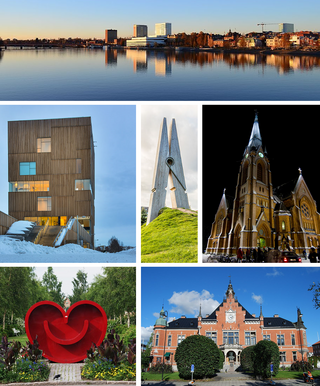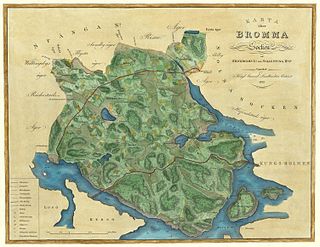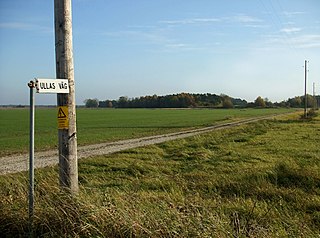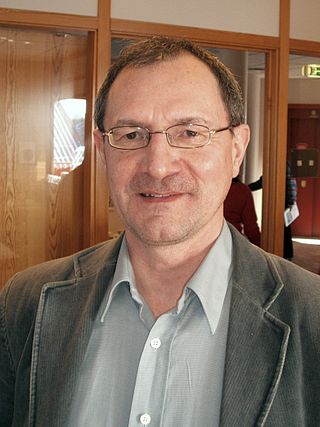In 1999, the Minority Language Committee of Sweden formally declared five official minority languages: Finnish, Sámi languages, Romani, Yiddish, and Meänkieli.

Umeå is a city in northeast Sweden. It is the seat of Umeå Municipality and the capital of Västerbotten County.

Vilhelmina is a locality and the central town of Vilhelmina Municipality in Västerbotten County, in the province of Lapland, Sweden with 3,657 inhabitants in 2010. Vilhelmina is situated by Lake Volgsjön in the Ångerman River, with the smaller Lake Baksjön located to the east of the community. Vilhelmina Church and Volgsjö School are located in Vilhelmina.

Sorsele is a locality and the seat of Sorsele Municipality in Västerbotten County, province of Lapland, Sweden with 1,277 inhabitants in 2010. Sorsele is also the nearest town to the ski resort Nalovardo. It is known for containing a portion of the Vindelfjällen Nature Reserve, one of the largest nature reserves in Sweden.

Ljugarn is a locality on the Swedish island of Gotland, with 200 inhabitants in 2014. It is located at the east coast of the island in Ardre south of Slite. It is regarded as a popular and quiet area as well as holiday village for tourists and vacationers. Ljugarn is the oldest seaside resort in Gotland, and was formerly a port, fishing village, pilot station and the county seat of Ljugarn County. The 1.5 km (0.93 mi) long flat sandy beach, one of the longest in Gotland, is visited throughout the year. Since the early 20th century the village has had pensions, restaurants, hostels, coffee-shops and a grocery store.
Arkelstorp is a locality situated in Kristianstad Municipality, Skåne County, Sweden. At the end of 2010 it had 768 inhabitants. The name was written in the 1570s Archilstorp and is taken from the village on whose land the settlement grew after the opening of the railway station in 1885. The suffix is torp, 'new building'. The prefix contains the male name Arnketil.

Södra Vi is a locality situated in Vimmerby Municipality, Kalmar County, Sweden with 1,182 inhabitants in 2010. According to Svenskt ortnamnslexikon the name of the locality loosely mean "southern place of worship". Tens of kilometers to the northwest lies Norra Vi.

Fleringe is a populated area, a socken, on the Swedish island of Gotland. It comprises the same area as the administrative Fleringe District, established on 1 January 2016.

Socken is the name used for a part of a county in Sweden. In Denmark similar areas are known as sogn, in Norway sokn or sogn and in Finland pitäjä(socken). A socken is an rural area formed around a church, typically in the Middle Ages. A socken originally served as a parish. Later it also served as a civil parish or an administrative parish, and became a predecessor to today's municipalities of Sweden, Finland, Norway and Denmark. Today it is a traditional area with frozen borders, in Sweden typically identical to those of the early 20th century rural parishes. The socken also served as a registration unit for buildings, in Sweden recently replaced by identical districts as registration unit. A socken consists of several villages and industry localities, and is typically named after the main village and the original church.

Danmark Church is a church located in the minor locality of Danmark in Uppsala Municipality, Sweden, some 8 kilometers southeast of Uppsala.

Bromma socken is a former socken of Sollentuna Hundred in Uppland, Sweden. It became part of City of Stockholm in 1916, and has been part of the municipalities of Stockholm and Sundbyberg since 1971.

Ivetofta is a village and a suburb of Bromölla, in Skåne County in southern Sweden. With a history going back to the 12th century, it was once a rural municipality in the former Kristianstad County. It lies on the eastern bank of Ivö Lake, between Ivö and the smaller lake Levrasjön. The Ivetofta Local Historical Society was founded in 1981 and as of 2013 has nearly 500 members.

Hed socken in Västmanland, Sweden, was a part of the Skinnskattebergs bergslag and is since 1971, a part of Skinnskatteberg Municipality.

Barlingbo is a populated area, a socken, on the Swedish island of Gotland. It comprises the same area as the administrative Barlingbo District, established on 1 January 2016. It is mostly known for the Stafva Manor, the largest cheese producer, and once one of the largest farms, on Gotland.

Enok Mikael Svonni (born 3 September 1950) is a Swedish Sámi linguist, professor, and translator.

Norra Vi is a village at the end of the southeastern arm of Lake Sommen in South Swedish highlands. Administratively it belongs to Ydre Municipality and Östergötland County. According to Svenskt ortnamnslexikon the name of the locality loosely mean "northern place of worship". Tens of kilometers to the southeast lies Södra Vi.

Sund is a hamlet in Ydre Municipality in the South Swedish highlands. According to Svenskt ortnamnslexikon the name of the locality means "narrow" referring to its position at the bottleneck position between Norra Sundsjön and Södra Sundsjön.

Torpa is a village in Ydre Municipality, Östergötland County. It lies in the traditional province of Östergötland along the shores of Lake Sommen the in South Swedish highlands. According to Svenskt ortnamnslexikon the name of the locality is first attested in 1281 as Thorpum, possibly in reference as "new settlement".

Asby is a village in Ydre Municipality, Östergötland County. It lies in the traditional province of Östergötland near the arm of the Lake Sommen called Asbyfjärden. According to Svenskt ortnamnslexikon the name of the locality is first attested in 1336 as Aasby, in reference to the drumlin-like ridge the locality is built on.

Blåvik is a village in Boxholm Municipality, Östergötland County. It lies in the traditional province of Östergötland at the northern shores of Lake Sommen. According to Svenskt ortnamnslexikon the name of the locality is first attested in 1307 as Blawijk, meaning not the ordinary blue color but "dark blue" and "dark". This is likely a reference to color of the lake embayment at place.




















